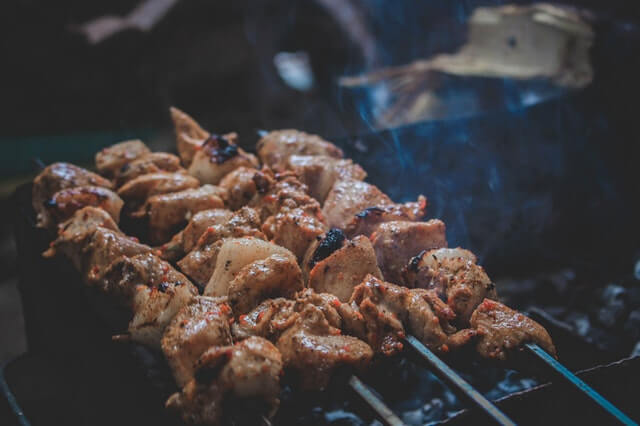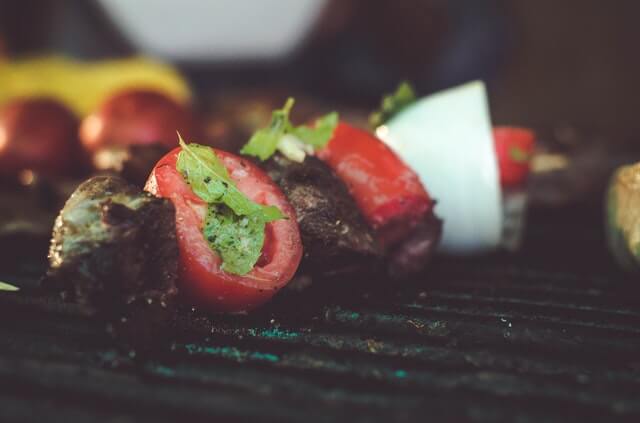Last updated on July 29th, 2021 at 04:10 am
If you’re like most Americans, the warm weather of spring brings the promise of one thing: grilling season. Somewhere around 70% of us own a smoker or grill, and there are few meals as American as a backyard barbecue—and all the fatty fare that they create.
This can be an issue if you’re trying to stick to healthier foods. After all, when an event centers around hefty cuts of red meat, it can be hard to stay focused on health!
Fortunately, there are plenty of options when it comes to healthy grilling. From finding the right proteins to preparing your grill, here are the tips you need to know for flavorful and healthy grilled food.
1. Grill More Fruits and Vegetables
Sure, most consider protein to be the main star of any grilling event. However, making more grilled vegetables and fruit can be a great way to get more healthy nutrients onto your plate. Just as you’re more likely to eat well when there are healthy foods in your pantry, you’re more likely to reach for healthy grilled food when there’s more of it available.
Beyond the simple facts of better nutrients and more antioxidants, grilled fruits and veggies can help in another way as well. These chemicals can affect the DNA structures in your body, and they’re even linked with cancer.
However, these chemicals don’t form on grilled fruit and veggies. In other words, you’ll be able to indulge in guilt-free snacking that won’t have a negative impact on your long-term health!
If you’re new to grilling vegetables and fruits, here are a few popular options to try:
- Onions
- Bell peppers
- Zucchini
- Eggplant
- Asparagus
- Pineapple
- Mango
- Pear
- Apple
- Peaches
- Plums
You can either grill the vegetables plain, or you can coat them in a simple marinade to pack in the flavor. As for the fruit, consider serving them as an easy, healthy dessert to follow up on the main meal.
As a side note, you may also want to consider preparing a plate of raw veggies and dip as well. Most grill lovers are prone to pairing their meals with potato chips, but raw veggies provide a similar crunch with much better nutritional value.
2. Opt for the Right Proteins

If you still want to get some protein onto the grill, there are plenty of healthy options to choose from.
First, consider choosing grilled fish over grilled meats. Heart-healthy options like salmon, herring, and trout come packed with omega-3s, which are a great asset to your health overall.
If you prefer meat, make sure to opt for lean cuts. Loin and round cuts of red meat are preferable to fattier cuts, for example, and you should opt for white meat over dark meat when you’re buying chicken to grill. Don’t forget to also reach for “choice” and “select” beef grades instead of “prime,” which tends to have more fat.
Read next: Sushi for Beginners: 6 Tasty and Popular Rolls for Newbies
3. Use Your Grill Wisely
Going back to the topic of those nasty HCAs and PAHs, there are simple ways to get less of them onto the proteins you cook.
Start With a Clean Grill
Cooking on a grill that’s layered with food buildup isn’t just gross; it’s also a health hazard. Food waste and grease from animal proteins and fats can contain harmful carcinogens, and these chemicals grow more concentrated with high heat.
To avoid this issue, make sure you clean the surface of your grill well, removing anything that might be transferred onto the new foods you’re cooking. Cleaning is often easier with newer, cleanup-friendly grills, so if you’re in the market for an update, be sure to check out more here. If you have an older grill that’s hard to clean, consider covering your grilling surface in perforated foil as an extra safety measure.
Turn Down the Temperature
HCAs and PAHs form once you’ve exposed protein-rich foods to high heat. However, you can minimize your exposure by cooking your meats at a lower temperature for a longer period of time. Alternatively, grilling thin cuts of meat can reduce the overall cooking time.
Add a Finishing Touch
If you want a safe way to avoid all the unwanted chemicals, there’s an easy way to go about it: use the grill as a finishing touch. Alter your favorite grilling recipes to cook the food in the oven or stove first, and use the grill to get those classic striped scorch marks we all know and love.
4. Pick the Right Marinades

When you’re into healthy eating, it’s important to consider every ingredient you put into your mouth. Once you have your protein, fruit, and vegetable powerhouses ready to go, it’s time to consider your marinade!
Store-bought marinades can come packed with processed ingredients and even food dyes, none of which you want anywhere near your grill.
Instead, be sure to make your own marinades, as they’re simple to whip up and easy to customize according to your tastes. In general, fat-free and low-fat marinades can be great options to help cut back on those PAHs and HCAs, and they’ll also be better for your diet as well.
For healthy marinades, reach for ingredients like lemon or lime juice, extra virgin olive oil, low-sodium soy sauce, herbs, spices, onions, and garlic.
Read next: How to Plan a Picnic: The Basics Explained
Make the Most of Grilling Season
Grilling season is fast approaching—and it’s time to get ready for the delicious food it brings. As you consider the best ways to get more healthy foods onto your plate, make sure to try these tips to make the most of your next backyard barbecue!
Want more helpful guides like this one? Check out our other posts for tips on food, health, and much more.
